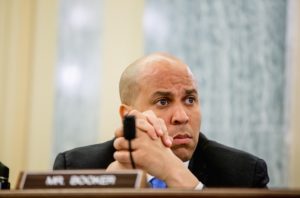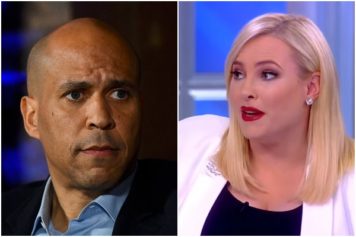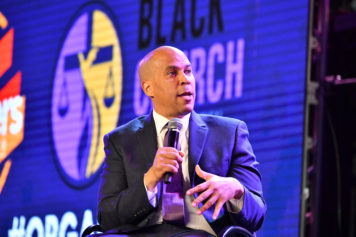
Sen. Cory Booker, D-N.J., at a Senate hearing June 10, 2015, (AP Photo/Andrew Harnik)
Two weeks ago, Sen. Cory Booker made history when he testified at the confirmation hearings for Sen. Jeff Sessions, nominated by Trump to become the country’s next Attorney General. In doing so, Booker became the first senator to testify in opposition to another sitting senator’s nomination.
“Sen. Sessions has not demonstrated a commitment to a central requisite of the job: to aggressively pursue the congressional mandate of civil rights, equal rights and justice for all of our citizens,” Booker testified. “In fact, at numerous times in his career, he has demonstrated a hostility towards these convictions and has worked to frustrate attempts to advance these ideals.”
Booker’s stance on the Sessions nomination is just one of several examples of his willingness to speak out against the incoming Trump administration. When Trump announced a senior White House advisory position for Steve Bannon, former executive of the Breitbart website that routinely peddles racism, anti-Semitism and more, Cory Booker issued a statement criticizing the appointment. And Booker has done several interviews, including one on “Meet the Press,” emphasizing his intent to fully resist the Trump agenda.
However, despite Booker’s willingness to challenge Trump and his previous efforts to position himself as the future of the Democratic Party, Booker’s progressive bona fides have been tarnished over the past couple of weeks. As more than 60 congressional Democrats announced that they would refuse to attend Trump’s inauguration, Booker stated that he would not join the boycott. “I respect everybody’s choice in this,” he said. “My personal feeling is this is the peaceful transition of power.”
Most of the Democratic congresspeople refusing to attend the inauguration were doing so in large part due to Trump’s Twitter attack against Rep. John Lewis. Given that Booker had just sat right next to Lewis as they both testified against Sessions, one would think that Booker would have supported the civil rights icon by joining the boycott, but that was not to be the case.
More important than the symbolism of Booker’s inauguration attendance is his recent vote in regards to making prescription drugs more affordable—a vote that does not allow him to find refuge in U.S. traditions and which conflicts with the choice that most Democratic senators made. On January 11, Senators Bernie Sanders and Amy Klobuchar introduced a budget amendment that would have made it easier for prescription drugs to be imported from Canada, where drug prices are significantly cheaper.
The vote on the amendment was largely along party lines, with most Democrats supporting the amendment and most Republicans against it. However, 13 Republicans crossed party lines to support the importation of the cheaper drugs, meaning the amendment could have easily passed. The only problem is that 13 Democrats also voted against their party, causing the amendment to fail. Cory Booker was one of the 13.
In a statement sent to Jezebel, Booker rationalized his vote by stating, “Any plan to allow the importation of prescription medications should also include consumer protections that ensure foreign drugs meet American safety standards.” However, Booker’s explanation is woefully insufficient for at least two reasons.
First, what Booker refers to as “foreign drugs” aren’t really foreign, since most of the drugs that would be imported from Canada were originally manufactured in the U.S. Second, and perhaps more important, just last month Booker and most of the Senate approved a bill that Public Citizen characterized as a “gift to Big Pharma” because it undermined “FDA requirements for ensuring that drugs and medical devices are safe and effective.”
In other words, Booker and his colleagues have little concern for drug approval safety requirements when it benefits Big Pharma, but hypocritically cite safety concerns to protect Big Pharma’s profits.
In order to understand the double standard, one need only consider the maxim, “Follow the money.” Based on data from the Center for Responsive Politics compiled by MapLight, over the past six years, Cory Booker received $267,338 from the pharmaceutical industry, more than any other Democratic senator and surpassed by only two Republicans.
When questioned about campaign contributions from corporate special interests, some politicians respond by claiming that there is no evidence that such contributions have affected their votes on progressive policy. Certainly, that was a response that Hillary Clinton and her surrogates often gave when asked about speaking fees from Wall Street. However, given Booker’s most recent votes on matters involving Big Pharma, it will be difficult for him to rely on that defense.
Unfortunately, the pharmaceutical industry is not the only big-money source that Booker has relied on for financial support. According to the Center for Responsive Politics, at least $531,000 of funds raised for Booker’s 2013 Senate campaign came from the financial industry. In 2012, Booker demonstrated his affection for venture capital while sharply criticizing the Obama campaign for attacks against Mitt Romney and Bain capital. In a widely publicized appearance on “Meet the Press,” Booker called such attacks “nauseating” and stated that he was “not about to sit here and indict private equity.” He added that Bain Capital “had done a lot to support businesses,” all while he was supposed to be speaking as a surrogate for the Obama campaign.
Perhaps the Obama campaign should have taken a closer look at Booker’s connection to Wall Street in general, and Bain Capital in particular, prior to allowing him to serve as a surrogate. As ThinkProgress reported, Booker’s relationship with Bain Capital dates at least as far back as his first (unsuccessful) run for mayor in 2002.
In addition, Booker has become quite cozy with Silicon Valley and the tech industry. In fact, his tech industry connections (along with Oprah Winfrey) helped him to launch an Internet firm, Booker’s share of which was estimated to be between $1 million and $5 million, according to The New York Times. Booker sold his interest in the company and reportedly donated the profits to charity.
So, who is the real Cory Booker?
One way to answer this question is to look at Booker’s tenure as mayor of Newark. A few months ago, Politico reflected on the “Newark Mirage,” two mayoral terms of mixed results, at best. There was a decrease in crime, followed by an increase, and a decreasing unemployment rate, which, at more than 11%percent, was still double the national average. New businesses were recruited into the city’s downtown, but few of jobs created by those businesses went to Newark residents. The city’s water authority, which Booker tried and failed to privatize, eventually became bogged in accusations of corruption and mismanagement, and Booker was even named as a defendant in a lawsuit related to its failures. Nothing particularly progressive in that track record.
In fact, perhaps the most significant and most controversial policy initiative Booker launched was his effort to implement a widespread charter school and voucher plan in Newark’s school district. Some have argued that the plan to revamp the city’s school system was connected to a desire to facilitate gentrification in the city, particularly in the downtown area.
Whatever the motivation, Booker’s strategy resulted in his most famous donation to date, a $100 million pledge from Facebook’s Mark Zuckerberg, which was announced on the Oprah Winfrey Show, much to the surprise of Newark’s parents and educators, who were essentially left out of the loop. But Booker’s plan was not his alone; it was a reflection of policy objectives from several conservative think tanks and foundations, such as the Bradley Foundation, with which Booker had a relationship.
Given Booker’s connections with the charter and voucher movement, it will be interesting to see what stance he takes regarding the confirmation of Trump’s nominee for Secretary of Education. Besides ethics considerations, one of the main critiques of Betsy DeVos is her role in financing the charter/voucher movement in Michigan — a movement that has not produced positive results for Michigan’s schools.
In spite of Booker’s mixed record and his relationship with the special interests mentioned earlier, he continues to be mentioned as a rising Democratic star and potential 2020 presidential candidate. Booker himself has made no official mention of any 2020 ambitions, however. As recently as Saturday (Jan. 21), in an interview with CNN, when asked whether he would run for president, Booker first answered with a simple, “No.” He then added that right now, he doesn’t “care about 2020,” and that he doesn’t “even want to have the discussion right now.”
In reality, at this point, there’s no reason to expect him or any other potential candidate to say anything more than that, considering the country just inaugurated the current president a couple of days ago. His response to that question will surely morph over the next two years.
But regardless of what Booker decides to do, it is the Democratic Party, and more specifically, Democratic voters, who have a more important decision to make. Democrats will have to decide what type of party they intend to be — one that will more fully embrace its progressive base or one that will continue down the road of catering to swing voters.
Either way, if the question of “Who is the real Cory Booker?” does not have a definitive answer, then Booker is definitely not the answer for this political moment. The fact that the question even needs to be asked is problematic and a candidate surrounded by ambiguity is certainly not the solution for a party in desperate need of clarity.


